
Apr 23, 2018 | Focolare Worldwide
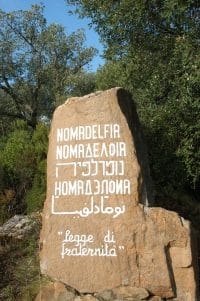
Copyright © 2018 Nomadelfia

Fr. Zeno Saltini. Foto © 2018 Nomadelfia

22 April 2018: Official visit to the international centre of the Focolare Movement in Rocca di Papa (Rome). ©CSC Audiovisivi
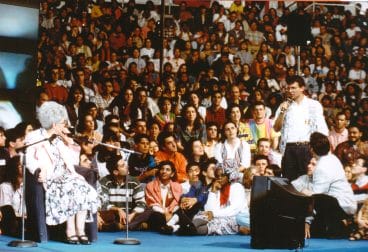
Mar 23, 2018 | Focolare Worldwide
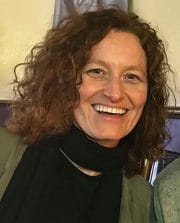
Michelle Sopala
 And now for the Genfest, itself! Even though it was a life-changing event in all its aspects, I can’t hide it: for me the highlight was the meeting with Chiara. I don’t know if the other 12 thousand young people in the arena felt the same, but I felt like Chiara was talking to me, and me alone. When Noel asked her the final question, «Chiara, from the bottom of your heart, what would you like to say to us young people?», her answer rang out like a war-call that still rings in my ears. With a super-astute intuition and understanding of what the young heart yearns for, she quoted St. Catherine who had told her disciples not to be satisfied with small things because “God wants them big!”. «You, young people – she said, with a conviction that went straight to the heart – don’t be satisfied with crumbs… with small joys… but aim high and seek the fullness of joy: that joy that comes from living out unity!» Hmm. For better or for worse, that’s been my experience ever since. “Unity”? A deep word that I’m still discovering after these 23 years. But that “fullness of joy”? Yep! I’ve found it! Oh! …and by the way, our performance was chosen. Take a look. Hope you like it! Michelle Sopala
And now for the Genfest, itself! Even though it was a life-changing event in all its aspects, I can’t hide it: for me the highlight was the meeting with Chiara. I don’t know if the other 12 thousand young people in the arena felt the same, but I felt like Chiara was talking to me, and me alone. When Noel asked her the final question, «Chiara, from the bottom of your heart, what would you like to say to us young people?», her answer rang out like a war-call that still rings in my ears. With a super-astute intuition and understanding of what the young heart yearns for, she quoted St. Catherine who had told her disciples not to be satisfied with small things because “God wants them big!”. «You, young people – she said, with a conviction that went straight to the heart – don’t be satisfied with crumbs… with small joys… but aim high and seek the fullness of joy: that joy that comes from living out unity!» Hmm. For better or for worse, that’s been my experience ever since. “Unity”? A deep word that I’m still discovering after these 23 years. But that “fullness of joy”? Yep! I’ve found it! Oh! …and by the way, our performance was chosen. Take a look. Hope you like it! Michelle Sopala
https://youtu.be/LX6rNkyGjoE

Mar 5, 2018 | Non categorizzato
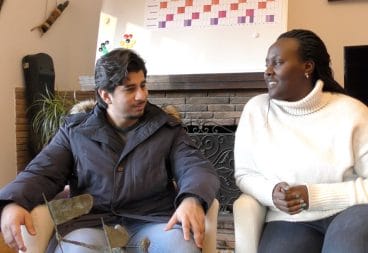
Nelson Vanegas and Stella Marilene Nishimwe
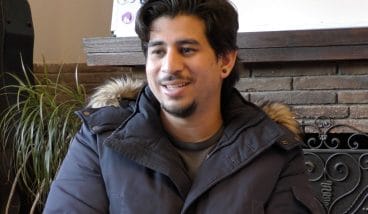 What is the situation of the youth in your country? “In Salvador.” answered Nelson, “the general situation of the youth differs from inside and outside the cities. Life outside is more difficult, services are lacking, and education is guaranteed only up to the compulsory education. Despite this the youth have huge aspirations and greater determination to make their dreams come true.” Marilene explained: “In Burundi we are undergoing a serious political crisis. Unemployment is sky high and also is uncertainty for the future. The youths often leave the country to seek other prospects elsewhere.” At the meeting, they say, they will carry out the role of facilitators of the linguistics groups in Spanish and French. “It will be our chance to do our part, a small contribution – Nelson added – but we shall do it with all our hearts.” And Marilene: “Through the synod’s official site (www.synod2018.va) and the social network connected, all the youths will be able to let their voice be heard and send proposals, as also those who cannot participate directly.” Speaking about communication, beyond the fears with which adults often regard the youths, as to the risk of detaching themselves from “reality” and immersing themselves in a virtual hub, what does communication mean for you? “Times have changed–Nelson answered – we are immersed in technology which effectively helps to bridge distances. But we have to try to make it possibly more humane. Cell phones and tablets draw people closer but communicating “face to face” with those who we really see before us is another thing altogether. In this sense we, the youth, can take the first step.” Marilene added: “For authentic communication we have to think of “what” we communicate.”
What is the situation of the youth in your country? “In Salvador.” answered Nelson, “the general situation of the youth differs from inside and outside the cities. Life outside is more difficult, services are lacking, and education is guaranteed only up to the compulsory education. Despite this the youth have huge aspirations and greater determination to make their dreams come true.” Marilene explained: “In Burundi we are undergoing a serious political crisis. Unemployment is sky high and also is uncertainty for the future. The youths often leave the country to seek other prospects elsewhere.” At the meeting, they say, they will carry out the role of facilitators of the linguistics groups in Spanish and French. “It will be our chance to do our part, a small contribution – Nelson added – but we shall do it with all our hearts.” And Marilene: “Through the synod’s official site (www.synod2018.va) and the social network connected, all the youths will be able to let their voice be heard and send proposals, as also those who cannot participate directly.” Speaking about communication, beyond the fears with which adults often regard the youths, as to the risk of detaching themselves from “reality” and immersing themselves in a virtual hub, what does communication mean for you? “Times have changed–Nelson answered – we are immersed in technology which effectively helps to bridge distances. But we have to try to make it possibly more humane. Cell phones and tablets draw people closer but communicating “face to face” with those who we really see before us is another thing altogether. In this sense we, the youth, can take the first step.” Marilene added: “For authentic communication we have to think of “what” we communicate.”  In his message for the youth day, which will end the pre-synod Meeting, Pope Francis mentioned the “fears” of the youth. “Often the youths are scared of going forward, to make choices from which they cannot turn back. “Personally,” Marilene explained, “I try to live God’s will in the present moment. Each one has his own story, and I entrust myself to Him.” Nelsno continued: “In such a materialistic world, often the message the adults pass to the youths concerns studying, working, earning, or buying a nice house. The dialogue between the first and second generation is important, but it should not destroy one’s dreams. Together, our energy and their wisdom can do a lot.” Being listened to means taking up some responsibilities. “It is a big responsibility to speak out for the youth. It’s an opportunity offered by the Church which wants to dialogue with all, and not only with the Catholics. It’s here that we Gen can offer our experience, because we have already started to walk together, with Christians of other faiths and also with agnostics. This is why I would call all the youths, also from afar, to participate! Let’s make our voice be heard.” Chiara Favotti
In his message for the youth day, which will end the pre-synod Meeting, Pope Francis mentioned the “fears” of the youth. “Often the youths are scared of going forward, to make choices from which they cannot turn back. “Personally,” Marilene explained, “I try to live God’s will in the present moment. Each one has his own story, and I entrust myself to Him.” Nelsno continued: “In such a materialistic world, often the message the adults pass to the youths concerns studying, working, earning, or buying a nice house. The dialogue between the first and second generation is important, but it should not destroy one’s dreams. Together, our energy and their wisdom can do a lot.” Being listened to means taking up some responsibilities. “It is a big responsibility to speak out for the youth. It’s an opportunity offered by the Church which wants to dialogue with all, and not only with the Catholics. It’s here that we Gen can offer our experience, because we have already started to walk together, with Christians of other faiths and also with agnostics. This is why I would call all the youths, also from afar, to participate! Let’s make our voice be heard.” Chiara Favotti











